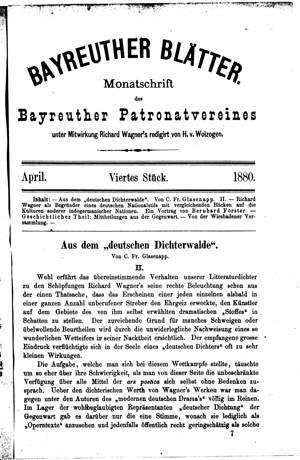Bayreuther Blätter
RIPM Preservation Series: European and North American Music Periodicals (2014)
 Editor: Hans von Wolzogen
Editor: Hans von WolzogenPeriodicity: Monthly
Publisher: Ernst Schmeitzner
Language: German
Forthcoming: Vol. 38-61 (1915-1939)
“On the 8th December [1877] he [Richard Wagner] announced to the Patrons and the members of the Vereine a sort of ‘compensation’ for the failure of the School plan -- the founding of a journal. The Bayreuther Blätter, that should serve as a mouthpiece for himself and those who thought and felt with him. It was the realisation of an idea that has obsessed him for many years. He found an editor after his own heart in Hans von Wolzogen, a young man of twenty-nine in 1877 whose private means enabled him to settle permanently in Bayreuth and devote his life to the cause of Wagner. The new magazine, the first number of which appeared in February, 1878, was intended to be free of the usual publishing interests and of dependence on advertisements or public sales. Wagner introduced it with an article in which he poured out his contempt for the Press and the public of the big cities. Salvation, he held, could come only from the tiny towns that represented the real Germany, and from a nucleus of right-minded people who would turn their backs disdainfully on the State theatres, the High Schools of Music, and the concert halls and other places in which bad style had become traditional.”
Ernest Newman, The Life of Richard Wagner, Vol. 4 (1866-1883) (New York: Alfred A. Knopf, 1933-1946): 574-75.
“Wagner’s later essays do him little credit. From 1878 onwards, they appeared in the Bayreuther Blaetter, the Bayreuth enterprise’s central organ, expressing a change in his intellectual development that reflected the change in his personality. They confirmed his reputation as Germany’s best-known anti-Semite, permanently blackening his image and obscuring his true achievements. ...Its articles of faith were promulgated in the pages of the Bayreuther Blätter, with its limited circulation of no more that 1,500 copies, and were in the same relation to Wagner’s true philosophy as the Bayreuth Master was to the homeless genius who had once declared love to be humanity’s true god.”
Joachim Köhler, Richard Wagner: The Last of the Titans, trans. Stewart Spencer (New Haven: Yale University Press, 2004): 558.
